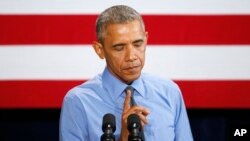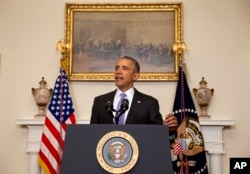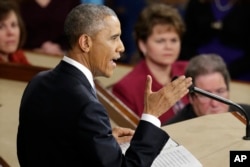From raising the American flag at the U.S. Embassy in Havana for the first time in half a century to leading efforts to negotiate a landmark nuclear agreement with Iran, 2015 was a year of diplomacy for President Barack Obama.
“This deal demonstrates that American diplomacy can bring about real and meaningful change, change that makes our country, and the world, safer and more secure,” the U.S. leader noted as he announced the Iran deal in the early morning hours of July 14.
For an American president wrapping up his time in office, Obama spent the last year focused on foreign policy initiatives aimed at re-shaping the U.S. role in key regions of the world, whether it be Latin America, Asia or the Middle East.
“If in the next year we see things moving in a positive direction on Iran, on Cuba, on Ukraine, then I think we will look back and say that Obama proved his point: that American political moves and diplomacy can really make a difference,” said Bruce Jones, director of the foreign policy program at Brookings Institution.
Global engagement
It will be months, if not years, before the success of the Cuba, Iran, and Trans-Pacific Partnership can be gauged.
Yet Jones says Obama’s efforts to mobilize the world in confronting climate change, including negotiating a deal with Beijing to curb emissions, has had a more immediate effect, with nearly 200 nations approving a landmark climate agreement in Paris.
“To get the United States and China, the two biggest emitters in the world to agree on a bilateral approach to begin reductions, transformed the global negotiations and showed what it means when the two biggest players can lead together,” the Brookings policy analyst said
Obama scored a major foreign policy victory when 12 nations signed the Trans-Pacific Partnership (TPP) agreement, a massive trade deal that is the economic centerpiece of the U.S. strategic rebalance to the Asia Pacific. Each nation must still ratify the agreement.
The president must walk a fine line in 2016 as he seeks to deepen ties in the region without increasing tensions with China, over issues like the territorial disputes in the South China Sea.
Obama is scheduled host Asia-Pacific leaders this year in a bid to solidify the U.S. as an economic and security leader there.
Terrorism challenge
But as Obama marked a year focused on diplomacy, the Middle East continues to pose the most serious challenge to his foreign policy legacy as Obama begins the final year of his presidency.
From turmoil in Libya and Yemen to the rise of the Islamic State militant group in Iraq and Syria, a president who came to power with the goal of ending wars in the Middle East now finds himself deeply embroiled in regional conflicts that will still be simmering when a new president enters the Oval Office in January of 2017.
“The challenge of terrorism and what is happening in the Middle East, which is not just an al-Qaida problem, but really the disintegration of countries across that strategically vital region and how the United States and the world respond to that, is something that is in flux and something where I do not think anyone has figured out the magic formula,” said Vikram Singh with the Center for American Progress.
The Syrian war that seemed distant to most Americans - despite images of beheadings by Islamic State militants and refugees desperately trying to cross into Europe – hit home with the December 2 terrorist attack in San Bernardino, California, that killed 14 people.
Amid low approval ratings, President Obama spent the weeks since the shooting, trying to reassure Americans they are safe, despite a threat he says is “real” but will be overcome.
“The terrorist threat has evolved into a new phase. As we’ve become better at preventing complex, multifaceted attacks like 9/11, terrorists turned to less complicated acts of violence like the mass shootings that are all too common in our society,” Obama said during a December 6 Oval Office address to Americans.
Some say Obama’s use of drone and airstrikes, special forces, and increased vigilance at home to counter the threat has not been enough.
Brookings Institution’s Bruce Jones says, in contrast to former President Bush’s counterterrorism strategy, the Obama administration's is an exercise in the overuse of diplomacy and underuse of force.
“The notion that we confront ISIS without a more serious military strategy, and we can deal with Syria without a more serious military strategy, again, is fanciful. If you say to yourself, 'I don’t want to use military force and therefore I am doing everything I can without it', you have already removed one of your more important tools.”
Jones says he is not calling for a ground invasion of Syria or Iraq, an option repeatedly rejected by Obama, but a more forward-leaning posture from day one.
Even with a more forceful intervention early on, the Center for American Progress’ Vikram Singh says it is difficult to assess whether the face of the Middle East crisis would look any different today.
“There are obviously things that you could say, 'oh, if we had only done this, if we had only done that, if we had bombed Assad earlier, if we had stayed in Iraq longer', but I don’t know that we would not be still facing a very difficult, and very long-term challenge,” said the former senior State Department and Pentagon official.
Inheriting challenges and diplomatic dealings
Singh notes U.S. foreign policy tends to build from administration to administration, and despite all the campaign bluster, Obama’s major global efforts will likely not be undone by the next president – whether a Democrat or Republican.
“What you are going to find in 2017 that any president discovers very quickly the limits of their power and the fact that the big problems of the world can not be solved by any unilateral action by any one nation. And they have to figure out how do you practically start to figure out how to get things done.”
Mary Alice Salinas contributed to this report from the White House






